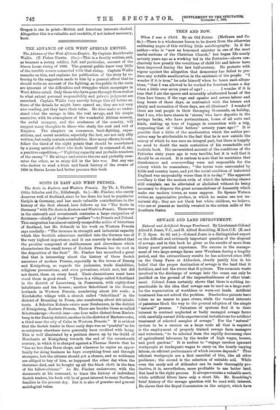THEN AND NOW.
When I was a Child. By an Old Potter. (Methuen and Co. 6s.)—There is a wholesome lesson to be drawn from the otherwise saddening pages of this striking little autobiography. In it the author—who is "now an honoured minister in one of the most useful sections of the Christian Church," but began life nearly seventy years ago as a working lad in the Potteries—shows con- clusively how greatly the conditions of child life and labour have been improved during the last half-century. He protests with vigour against the allegation that democracy has failed to pro- duce any notable amelioration in the existence of the people. "I wonder if it is true," he asks himself when he hears such allega- tions, "that I was allowed to be worked for fourteen hours a day
when a little over seven years of age? I wonder if it is true that I ate the sparse and miserably adulterated bread of the Corn Law times; if the rags and squalor and severe labour and long hours of those days, as contrasted with the leisure and plenty and recreation of these days, are all illusions ? I wonder if these are real people in their thronging thousands, on holiday, that I see, who have shares in 'stores,' who have deposits in the savings banks, who have portmanteaus, boxes of all sorts and kinds, making up tons of luggage in connection with a trip, surpassing that of 'their betters' seventy years ago?" It is possible that a little of the amelioration which the author per- ceives may be attributable to the fact that he is now outside the misery of which he was once an integral part, but there is happily no need to doubt the main contention of his remarkable and realistic book. His unvarnished account of the conditions of the Potteries sixty years ago is very terrible, but it is well that it should be on record. It is curious to note that he maintains that drunkenness and overcrowding were not responsible for the misery which he remembers ; "the towns were surrounded by fields and country lanes, and yet the social condition of industrial England was unspeakably worse than it is to-day." The apparent corollary is that the modern evils of which the labouring classes still complain can be alleviated or abolished without its being necessary to disperse the great accumulations of humanity which make our modern towns, as some suppose. Dr. Spence Watson writes an appreciative preface, in which he makes one not un- natural slip ; they are not black but white children, we believe, who are at present so terribly sweated in the cotton mills of the Southern States.






























































 Previous page
Previous page